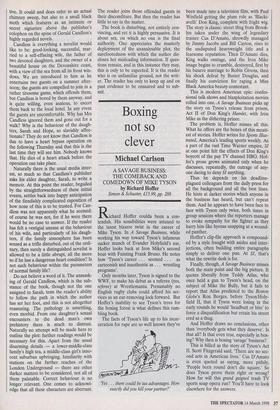Boxing not so clever
Michael Carlson
A SAVAGE BUSINESS: THE COMEBACK AND COMEDOWN OF MIKE TYSON by Richard Hoffer Simon & Schuster, £15.99, pp. 288 Richard Hoffer coulda been a con- tenduh. His sensibilities were attuned to the latest bizarre twist in the career of Mike Tyson. In A Savage Business, while working his way toward Tyson's infamous sucker munch of Evander Holyfield's ear, Hoffer looks back at Iron Mike's second bout with Fainting Frank Bruno. He notes how `Tyson's career . . . seemed . . . as cartoonish and inauthentic as . . . wrestling programs'.
Only months later, Tyson is signed to the WWF, to make his debut as a referee (yes, referee) at Wrestlemania. Presumably no English rugby clubs could afford his ser- vices as an ear-removing lock forward. But Hoffer's inability to see Tyson's trees for the boxing forest is what defines this ram- bling book.
The facts of Tyson's life up to his incar- ceration for rape are so well known they've Yes . . . there could be tax advantages. How exactly did you kill your partner?' been made into a television film, with Paul Winfield getting the plum role as Slacki- avelli' Don King, complete with fright wig. The story is classic: street thug from Brook- lyn taken under the wing of legendary trainer Cus D'Amato, shrewdly managed by Jimmy Jacobs and Bill Cayton, rises to the undisputed heavyweight title and a fearsome reputation. Then D'Amato dies, King walks onstage, and the Iron Mike image begins to crumble, destroyed, first by his bizarre marriage to Robin Givens, then his shock defeat by Buster Douglas, and finally his conviction for raping a Miss Black America beauty contestant.
This is modern American epic: confes- sional talk shows and blaxploitation movies rolled into one. A Savage Business picks up the story on Tyson's release from prison, Act II of Don King's Hamlet, with Iron Mike as the dithering prince.
The problem is, Hoffer misses all this. What he offers are the bones of this meati- est of stories. Hoffer writes for Sports Illus- trated, America's leading sports weekly. As a part of the vast Time Warner empire, SI at one point felt the effects of Don King's boycott of the pay TV channel HBO. Hof- fer's prose grows animated only when he discusses, repeatedly, the outrage of any- one daring to deny SI anything.
Thus he depends on his deadline- plagued colleagues from the daily press for all the background and all the best lines. He hints at darker stories which anyone in the business has heard, but can't repeat them. And he appears to have been face to face with Tyson only twice, both times in group sessions where the reporters manage to evoke sympathy for the fighter as they harry him like hyenas snapping at a wound- ed panther.
Hoffer's clip-file approach is compound- ed by a style fraught with asides and inter- jections, often building entire paragraphs simply to deliver one pun. At SI, that's what the rewrite desk is for.
Finally, though, A Savage Business misses both the main point and the big picture. It quotes liberally from Teddy Atlas, who once held a gun to Tyson's head, on the subject of Mike the Bully, but it fails to report that Atlas predicted to the Boston Globe's Ron Borges, before Tyson/Holy- field II, that if Tyson were losing in the early rounds he would `headbutt or bite' to force a disqualification but retain his street cred as a thug.
And Hoffer draws no conclusions, other than 'everybody gets what they deserve'. Is that all? Is that even true, especially in box- ing? Why then is boxing 'savage' business?
This is billed as the story of Tyson's Act II. Scott Fitzgerald said, 'There are no sec- ond acts in American lives.' Cus D'Amato is even quoted as saying, more pithily, `People born round don't die square.' So does Tyson prove them right or wrong? How far will this grand guignol trash TV sports soap opera run? You'll have to look elsewhere for the answers.


































































 Previous page
Previous page